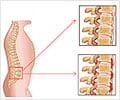Current smokers have a significantly higher rate of septic reoperation compared with nonsmokers.

TOP INSIGHT
Current smokers are at substantially higher risk of reoperation for septic complications. Patients with a history of heavier smoking are also at increased risk, even if they have since quit smoking.
The researchers looked at how smoking history affected the risk of hospital readmissions among patients undergoing total joint replacement--either hip or knee replacement. The study included data on 15,264 patients who underwent a total of 17,394 total joint replacements between 2000 and 2014--8,917 hip and 8,477 knee replacements.
At the time of surgery, nine percent of patients were current smokers, 34 percent were former smokers, and 57 percent were nonsmokers. Current smokers were younger than nonsmokers: average age was about 58 versus 63 years. Smokers also had higher rates of certain major respiratory and cardiovascular diseases.
The absolute risk of reoperation for infectious complications within 90 days was low: 0.71 percent. However, this risk was substantially higher for current smokers: 1.2 percent, compared to 0.56 percent for nonsmokers.
After adjustment for other characteristics, current smokers remained at significantly increased risk of reoperation for infectious complications--the relative risk was 80 percent higher, compared to nonsmokers. As a group, former smokers were not at increased risk.
Total joint replacement (also called arthroplasty) is an effective treatment for advanced degenerative joint disease. Nearly one million total joint replacements--most commonly of the hip and knee-- were performed in the United States in 2011. The demand for these procedures is expected to increase over the next decade.
While there's no difference in the total readmission rate, the new results suggest that current smokers are at substantially higher risk of reoperation for septic complications. Patients with a history of heavier smoking are also at increased risk, even if they have since quit smoking.
"If smoking is associated with elevated perioperative risk of readmission and/or reoperation, then it may be reasonable to engage the patient in a smoking cessation program prior to total joint arthroplasty," Dr. Austin and coauthors write. However, further studies would be needed to determine whether quitting smoking before joint replacement surgery can reduce the risk of complications.
Source-Eurekalert
 MEDINDIA
MEDINDIA




 Email
Email









